The Vulnerable Scientist
Only scientists who are honest and authentic or are working towards it will be on this podcast.Professor Brene Brown's research shows that vulnerability fosters good emotional and mental health. It is a sign of courage. We become more resilient and brave when we embrace who we truly are and what we are feeling. The Vulnerable Scientist Podcast is a space for scientists to tell their honest and authentic stories. I am your host Sarah Nyakeri who happens to be a scientist, Informal science communicator and I help scientists create personal websites. If you want to support this show, go to www.patreon.com/thevulnerablescientist.com You can also follow this podcast on all social media platforms @TVScientistPodTheVulnerableScientist.com See acast.com/privacy for privacy and opt-out information.
Episodes
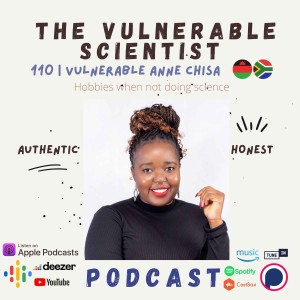
Monday May 09, 2022
Monday May 09, 2022
Anne Chisa, also known as Anne with an E, is the Root of Science Podcast host, a PhD Candidate in Crop Science at the University of Kwazulu Natal doing her research on using human as a fertilizer. She is also a science communicator, Mc and Moderator. This episode talks about her hobbies and things she indulges in when not recording a podcast episode or doing her PhD.The Vulnerable Scientist is a Kenyan-based podcast that focuses on scientists' stories about their daily lives, work, and how they got to where they are. I am your host Sarah Nyakeri, a scientist, informal science communicator and a hiker. I am a multidisciplinary individual that does digital marketing and website design during my free time.The main questions asked that scientists are expected to answer vulnerable are: How are you, Introduce yourself, how did you become a scientist, What are the highs and lows you have experienced in your science career, tell the listeners about your hobbies, what question would you like to answer that has not been asked and how do you feel after having this conversation.Why did I start this podcast? You might ask. When doing my MSc project, my experiments started to fail at a certain period and it was very frustrating. I thought, If I finally get a new vaccine target for CBPP in cows, it would be all smiles but no one will ever know what I went through. I also wondered how many scientists were going through the same rough patch but did not openly talk about it?One day when I had just had a rough day, I talked into a mic about my day and I felt better. That was the first episode. At first, I thought it would just be journalling but after some fellow scientists heard it, they wanted to be Vulnerable too. Since then I have brought scientists from different fields to tell their stories of the highs and lows they have experienced with honesty and authenticity being the lead of our informal and long conversations.I enjoy asking questions since I am a naturally curious person. Feedback from the audience, including scientists and non-scientists, is the main motivation I message scientists or accept their request to be on the podcast, schedule an interview, edit audio, design the artwork, post it, and share it on social media platforms. It is a full-time job that requires me to spend from my pocket with no monetary returns, but I enjoy it.If you want to be Vulnerable on the show, send me an audio message either on speak pipe (https://www.speakpipe.com/VulnerableScientistVoicemail ) or anchor (https://anchor.fm/thevulnerablescientist/message).Feel free to reach out too if you want to talk about a certain topic in the science career space or anything as a scientist that might have nothing to with science but affects scientists. The podcast is on social media @TVscientistPod and Website; TheVulnerablescientist.com.You can support the show (https://www.patreon.com/thevulnerablescientist) on Patreon or Paypal sarahnyanchera(at)gmail or Mpesa at (254)0718-896-962 under Sarah Nyakeri. See acast.com/privacy for privacy and opt-out information.
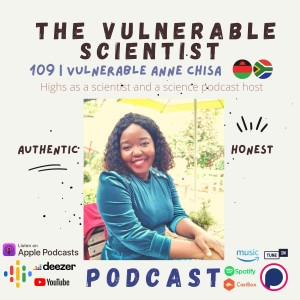
Friday May 06, 2022
Friday May 06, 2022
Anne Chisa, also known as Anne with an E, is the Root of Science Podcast host, a PhD Candidate in Crop Science at the University of Kwazulu Natal doing her research on using human as a fertilizer. She is also a science communicator, Mc and Moderator. This episode talks about her highs as a scientist and a science podcast host.The Vulnerable Scientist is a Kenyan-based podcast that focuses on scientists' stories about their daily lives, work, and how they got to where they are. I am your host Sarah Nyakeri, a scientist, informal science communicator and a hiker. I am a multidisciplinary individual that does digital marketing and website design during my free time.The main questions asked that scientists are expected to answer vulnerable are: How are you, Introduce yourself, how did you become a scientist, What are the highs and lows you have experienced in your science career, tell the listeners about your hobbies, what question would you like to answer that has not been asked and how do you feel after having this conversation.Why did I start this podcast? You might ask. When doing my MSc project, my experiments started to fail at a certain period and it was very frustrating. I thought, If I finally get a new vaccine target for CBPP in cows, it would be all smiles but no one will ever know what I went through. I also wondered how many scientists were going through the same rough patch but did not openly talk about it?One day when I had just had a rough day, I talked into a mic about my day and I felt better. That was the first episode. At first, I thought it would just be journalling but after some fellow scientists heard it, they wanted to be Vulnerable too. Since then I have brought scientists from different fields to tell their stories of the highs and lows they have experienced with honesty and authenticity being the lead of our informal and long conversations.I enjoy asking questions since I am a naturally curious person. Feedback from the audience, including scientists and non-scientists, is the main motivation I message scientists or accept their request to be on the podcast, schedule an interview, edit audio, design the artwork, post it, and share it on social media platforms. It is a full-time job that requires me to spend from my pocket with no monetary returns, but I enjoy it.If you want to be Vulnerable on the show, send me an audio message either on speak pipe (https://www.speakpipe.com/VulnerableScientistVoicemail ) or anchor (https://anchor.fm/thevulnerablescientist/message).Feel free to reach out too if you want to talk about a certain topic in the science career space or anything as a scientist that might have nothing to with science but affects scientists. The podcast is on social media @TVscientistPod and Website; TheVulnerablescientist.com.You can support the show (https://www.patreon.com/thevulnerablescientist) on Patreon or Paypal sarahnyanchera(at)gmail or Mpesa at (254)0718-896-962 under Sarah Nyakeri. See acast.com/privacy for privacy and opt-out information.
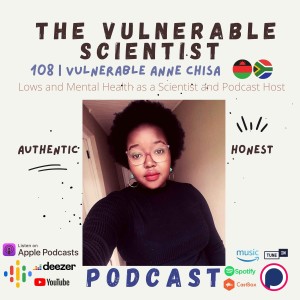
Thursday May 05, 2022
Thursday May 05, 2022
Anne Chisa, also known as Anne with an E, is the Root of Science Podcast host, a PhD Candidate in Crop Science at the University of Kwazulu Natal doing her research on using human as a fertilizer. She is also a science communicator, Mc and Moderator. This episode talks about her lows as a scientist and a science podcast host.The Vulnerable Scientist is a Kenyan-based podcast that focuses on scientists' stories about their daily lives, work, and how they got to where they are. I am your host Sarah Nyakeri, a scientist, informal science communicator and a hiker. I am a multidisciplinary individual that does digital marketing and website design during my free time.The main questions asked that scientists are expected to answer vulnerable are: How are you, Introduce yourself, how did you become a scientist, What are the highs and lows you have experienced in your science career, tell the listeners about your hobbies, what question would you like to answer that has not been asked and how do you feel after having this conversation.Why did I start this podcast? You might ask. When doing my MSc project, my experiments started to fail at a certain period and it was very frustrating. I thought, If I finally get a new vaccine target for CBPP in cows, it would be all smiles but no one will ever know what I went through. I also wondered how many scientists were going through the same rough patch but did not openly talk about it?One day when I had just had a rough day, I talked into a mic about my day and I felt better. That was the first episode. At first, I thought it would just be journalling but after some fellow scientists heard it, they wanted to be Vulnerable too. Since then I have brought scientists from different fields to tell their stories of the highs and lows they have experienced with honesty and authenticity being the lead of our informal and long conversations.I enjoy asking questions since I am a naturally curious person. Feedback from the audience, including scientists and non-scientists, is the main motivation I message scientists or accept their request to be on the podcast, schedule an interview, edit audio, design the artwork, post it, and share it on social media platforms. It is a full-time job that requires me to spend from my pocket with no monetary returns, but I enjoy it.If you want to be Vulnerable on the show, send me an audio message either on speak pipe (https://www.speakpipe.com/VulnerableScientistVoicemail ) or anchor (https://anchor.fm/thevulnerablescientist/message).Feel free to reach out too if you want to talk about a certain topic in the science career space or anything as a scientist that might have nothing to with science but affects scientists. The podcast is on social media @TVscientistPod and Website; TheVulnerablescientist.com.You can support the show (https://www.patreon.com/thevulnerablescientist) on Patreon or Paypal sarahnyanchera(at)gmail or Mpesa at (254)0718-896-962 under Sarah Nyakeri. See acast.com/privacy for privacy and opt-out information.
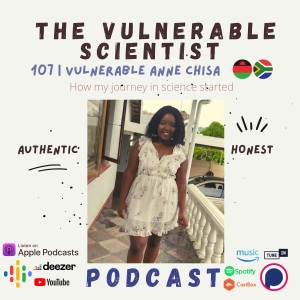
Wednesday May 04, 2022
Wednesday May 04, 2022
Anne Chisa, also known as Anne with an E, is the Root of Science Podcast host, a PhD Candidate in Crop Science at the University of Kwazulu Natal doing her research on using human as a fertilizer. She is also a science communicator, Mc and Moderator. In this episode, she talks about her early beginnings in Malawi and how her journey in science has been.The Vulnerable Scientist is a Kenyan-based podcast that focuses on scientists' stories about their daily lives, work, and how they got to where they are. I am your host Sarah Nyakeri, a scientist, informal science communicator and a hiker. I am a multidisciplinary individual that does digital marketing and website design during my free time.The main questions asked that scientists are expected to answer vulnerable are: How are you, Introduce yourself, how did you become a scientist, What are the highs and lows you have experienced in your science career, tell the listeners about your hobbies, what question would you like to answer that has not been asked and how do you feel after having this conversation.Why did I start this podcast? You might ask. When doing my MSc project, my experiments started to fail at a certain period and it was very frustrating. I thought, If I finally get a new vaccine target for CBPP in cows, it would be all smiles but no one will ever know what I went through. I also wondered how many scientists were going through the same rough patch but did not openly talk about it?One day when I had just had a rough day, I talked into a mic about my day and I felt better. That was the first episode. At first, I thought it would just be journalling but after some fellow scientists heard it, they wanted to be Vulnerable too. Since then I have brought scientists from different fields to tell their stories of the highs and lows they have experienced with honesty and authenticity being the lead of our informal and long conversations.I enjoy asking questions since I am a naturally curious person. Feedback from the audience, including scientists and non-scientists, is the main motivation I message scientists or accept their request to be on the podcast, schedule an interview, edit audio, design the artwork, post it, and share it on social media platforms. It is a full-time job that requires me to spend from my pocket with no monetary returns, but I enjoy it.If you want to be Vulnerable on the show, send me an audio message either on speak pipe (https://www.speakpipe.com/VulnerableScientistVoicemail ) or anchor (https://anchor.fm/thevulnerablescientist/message).Feel free to reach out too if you want to talk about a certain topic in the science career space or anything as a scientist that might have nothing to with science but affects scientists. The podcast is on social media @TVscientistPod and Website; TheVulnerablescientist.com.You can support the show (https://www.patreon.com/thevulnerablescientist) on Patreon or Paypal sarahnyanchera(at)gmail or Mpesa at (254)0718-896-962 under Sarah Nyakeri. See acast.com/privacy for privacy and opt-out information.
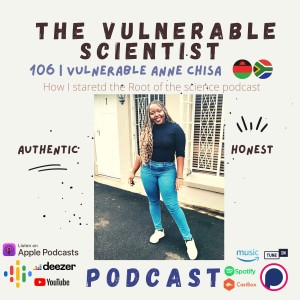
Tuesday May 03, 2022
Tuesday May 03, 2022
Anne Chisa, also known as Anne with an E, is the Root of Science Podcast host, a PhD Candidate in Crop Science at the University of Kwazulu Natal doing her research on using human as a fertilizer. She is also a science communicator, Mc and Moderator. In this episode, she talks about how she started the root of the science podcast and how it has been since then.The Vulnerable Scientist is a Kenyan-based podcast that focuses on scientists' stories about their daily lives, work, and how they got to where they are. I am your host Sarah Nyakeri, a scientist, informal science communicator and a hiker. I am a multidisciplinary individual that does digital marketing and website design during my free time.The main questions asked that scientists are expected to answer vulnerable are: How are you, Introduce yourself, how did you become a scientist, What are the highs and lows you have experienced in your science career, tell the listeners about your hobbies, what question would you like to answer that has not been asked and how do you feel after having this conversation.Why did I start this podcast? You might ask. When doing my MSc project, my experiments started to fail at a certain period and it was very frustrating. I thought, If I finally get a new vaccine target for CBPP in cows, it would be all smiles but no one will ever know what I went through. I also wondered how many scientists were going through the same rough patch but did not openly talk about it?One day when I had just had a rough day, I talked into a mic about my day and I felt better. That was the first episode. At first, I thought it would just be journalling but after some fellow scientists heard it, they wanted to be Vulnerable too. Since then I have brought scientists from different fields to tell their stories of the highs and lows they have experienced with honesty and authenticity being the lead of our informal and long conversations.I enjoy asking questions since I am a naturally curious person. Feedback from the audience, including scientists and non-scientists, is the main motivation I message scientists or accept their request to be on the podcast, schedule an interview, edit audio, design the artwork, post it, and share it on social media platforms. It is a full-time job that requires me to spend from my pocket with no monetary returns, but I enjoy it.If you want to be Vulnerable on the show, send me an audio message either on speak pipe (https://www.speakpipe.com/VulnerableScientistVoicemail ) or anchor (https://anchor.fm/thevulnerablescientist/message).Feel free to reach out too if you want to talk about a certain topic in the science career space or anything as a scientist that might have nothing to with science but affects scientists. The podcast is on social media @TVscientistPod and Website; TheVulnerablescientist.com.You can support the show (https://www.patreon.com/thevulnerablescientist) on Patreon or Paypal sarahnyanchera(at)gmail or Mpesa at (254)0718-896-962 under Sarah Nyakeri. See acast.com/privacy for privacy and opt-out information.
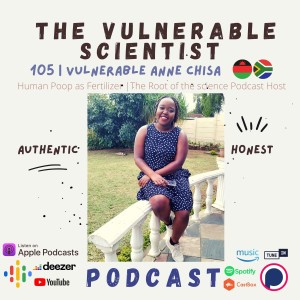
Monday May 02, 2022
Monday May 02, 2022
Anne Chisa, also known as Anne with an E, is the Root of Science Podcast host, a PhD Candidate in Crop Science at the University of Kwazulu Natal doing her research on using human as a fertilizer. She is also a science communicator, Mc and Moderator. In this episode, she talks about her research in-depth.The Vulnerable Scientist is a Kenyan-based podcast that focuses on scientists' stories about their daily lives, work, and how they got to where they are. I am your host Sarah Nyakeri, a scientist, informal science communicator and a hiker. I am a multidisciplinary individual that does digital marketing and website design during my free time.The main questions asked that scientists are expected to answer vulnerable are: How are you, Introduce yourself, how did you become a scientist, What are the highs and lows you have experienced in your science career, tell the listeners about your hobbies, what question would you like to answer that has not been asked and how do you feel after having this conversation.Why did I start this podcast? You might ask. When doing my MSc project, my experiments started to fail at a certain period and it was very frustrating. I thought, If I finally get a new vaccine target for CBPP in cows, it would be all smiles but no one will ever know what I went through. I also wondered how many scientists were going through the same rough patch but did not openly talk about it?One day when I had just had a rough day, I talked into a mic about my day and I felt better. That was the first episode. At first, I thought it would just be journalling but after some fellow scientists heard it, they wanted to be Vulnerable too. Since then I have brought scientists from different fields to tell their stories of the highs and lows they have experienced with honesty and authenticity being the lead of our informal and long conversations.I enjoy asking questions since I am a naturally curious person. Feedback from the audience, including scientists and non-scientists, is the main motivation I message scientists or accept their request to be on the podcast, schedule an interview, edit audio, design the artwork, post it, and share it on social media platforms. It is a full-time job that requires me to spend from my pocket with no monetary returns, but I enjoy it.If you want to be Vulnerable on the show, send me an audio message either on speak pipe (https://www.speakpipe.com/VulnerableScientistVoicemail ) or anchor (https://anchor.fm/thevulnerablescientist/message).Feel free to reach out too if you want to talk about a certain topic in the science career space or anything as a scientist that might have nothing to with science but affects scientists. The podcast is on social media @TVscientistPod and Website; TheVulnerablescientist.com.You can support the show (https://www.patreon.com/thevulnerablescientist) on Patreon or Paypal sarahnyanchera(at)gmail or Mpesa at (254)0718-896-962 under Sarah Nyakeri. See acast.com/privacy for privacy and opt-out information.
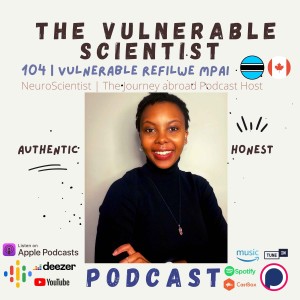
Friday Apr 29, 2022
Friday Apr 29, 2022
The Journey abroad Podcast Host, Refliwe Mpai is a Neuroscientist from Botswana and is currently based in Canada. She has a Psychology background and now doing an MSc in Neuroscience. She shares her story though most of the recording was lost this will be redone. Meanwhile, this is a long teaser of the upcoming conversation.The Vulnerable Scientist is a Kenyan-based podcast that focuses on scientists' stories about their daily lives, work, and how they got to where they are. I am your host Sarah Nyakeri, a scientist, informal science communicator and a hiker. I am a multidisciplinary individual that does digital marketing and website design during my free time.The main questions asked that scientists are expected to answer vulnerable are: How are you, Introduce yourself, how did you become a scientist, What are the highs and lows you have experienced in your science career, tell the listeners about your hobbies, what question would you like to answer that has not been asked and how do you feel after having this conversation.Why did I start this podcast? You might ask. When doing my MSc project, my experiments started to fail at a certain period and it was very frustrating. I thought, If I finally get a new vaccine target for CBPP in cows, it would be all smiles but no one will ever know what I went through. I also wondered how many scientists were going through the same rough patch but did not openly talk about it?One day when I had just had a rough day, I talked into a mic about my day and I felt better. That was the first episode. At first, I thought it would just be journalling but after some fellow scientists heard it, they wanted to be Vulnerable too. Since then I have brought scientists from different fields to tell their stories of the highs and lows they have experienced with honesty and authenticity being the lead of our informal and long conversations.I enjoy asking questions since I am a naturally curious person. Feedback from the audience, including scientists and non-scientists, is the main motivation I message scientists or accept their request to be on the podcast, schedule an interview, edit audio, design the artwork, post it, and share it on social media platforms. It is a full-time job that requires me to spend from my pocket with no monetary returns, but I enjoy it.If you want to be Vulnerable on the show, send me an audio message either on speak pipe (https://www.speakpipe.com/VulnerableScientistVoicemail ) or anchor (https://anchor.fm/thevulnerablescientist/message).Feel free to reach out too if you want to talk about a certain topic in the science career space or anything as a scientist that might have nothing to with science but affects scientists. The podcast is on social media @TVscientistPod and Website; TheVulnerablescientist.com.You can support the show (https://www.patreon.com/thevulnerablescientist) on Patreon or Paypal sarahnyanchera(at)gmail or Mpesa at (254)0718-896-962 under Sarah Nyakeri. See acast.com/privacy for privacy and opt-out information.
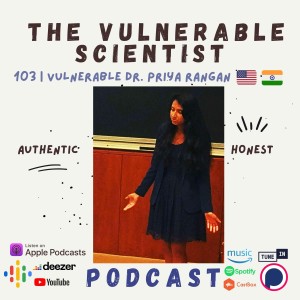
Thursday Apr 28, 2022
Thursday Apr 28, 2022
Dr Priya, a scientific communicator, is an experienced scientist with 11 years of combined working experience in academic research and pharmaceutical settings. Skilled in nutritional treatment applications for inflammatory bowel disease, Alzheimer's disease, and T cell immunotherapies, cell culture, in vivo mouse studies, microscopy, public speaking, science education, and scientific writing. Her PhD focused on the Biology of Aging from the University of Southern California.The Vulnerable Scientist is a Kenyan-based podcast that focuses on scientists' stories about their daily lives, work, and how they got to where they are. I am your host Sarah Nyakeri, a scientist, informal science communicator and a hiker. I am a multidisciplinary individual that does digital marketing and website design during my free time.The main questions asked that scientists are expected to answer vulnerable are: How are you, Introduce yourself, how did you become a scientist, What are the highs and lows you have experienced in your science career, tell the listeners about your hobbies, what question would you like to answer that has not been asked and how do you feel after having this conversation.Why did I start this podcast? You might ask. When doing my MSc project, my experiments started to fail at a certain period and it was very frustrating. I thought, If I finally get a new vaccine target for CBPP in cows, it would be all smiles but no one will ever know what I went through. I also wondered how many scientists were going through the same rough patch but did not openly talk about it?One day when I had just had a rough day, I talked into a mic about my day and I felt better. That was the first episode. At first, I thought it would just be journalling but after some fellow scientists heard it, they wanted to be Vulnerable too. Since then I have brought scientists from different fields to tell their stories of the highs and lows they have experienced with honesty and authenticity being the lead of our informal and long conversations.I enjoy asking questions since I am a naturally curious person. Feedback from the audience, including scientists and non-scientists, is the main motivation I message scientists or accept their request to be on the podcast, schedule an interview, edit audio, design the artwork, post it, and share it on social media platforms. It is a full-time job that requires me to spend from my pocket with no monetary returns, but I enjoy it.If you want to be Vulnerable on the show, send me an audio message either on speak pipe (https://www.speakpipe.com/VulnerableScientistVoicemail ) or anchor (https://anchor.fm/thevulnerablescientist/message).Feel free to reach out too if you want to talk about a certain topic in the science career space or anything as a scientist that might have nothing to with science but affects scientists. The podcast is on social media @TVscientistPod and Website; TheVulnerablescientist.com.You can support the show (https://www.patreon.com/thevulnerablescientist) on Patreon or Paypal sarahnyanchera(at)gmail or Mpesa at (254)0718896962 under Sarah Nyakeri. See acast.com/privacy for privacy and opt-out information.
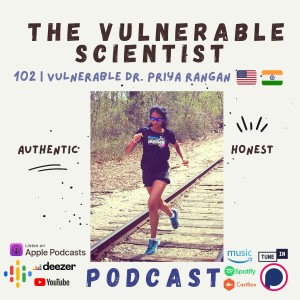
Wednesday Apr 27, 2022
Wednesday Apr 27, 2022
Dr Priya, a scientific communicator, is an experienced scientist with 11 years of combined working experience in academic research and pharmaceutical settings. Skilled in nutritional treatment applications for inflammatory bowel disease, Alzheimer's disease, and T cell immunotherapies, cell culture, in vivo mouse studies, microscopy, public speaking, science education, and scientific writing. Her PhD focused on the Biology of Aging from the University of Southern California.The Vulnerable Scientist is a Kenyan-based podcast that focuses on scientists' stories about their daily lives, work, and how they got to where they are. I am your host Sarah Nyakeri, a scientist, informal science communicator and a hiker. I am a multidisciplinary individual that does digital marketing and website design during my free time.The main questions asked that scientists are expected to answer vulnerable are: How are you, Introduce yourself, how did you become a scientist, What are the highs and lows you have experienced in your science career, tell the listeners about your hobbies, what question would you like to answer that has not been asked and how do you feel after having this conversation.Why did I start this podcast? You might ask. When doing my MSc project, my experiments started to fail at a certain period and it was very frustrating. I thought, If I finally get a new vaccine target for CBPP in cows, it would be all smiles but no one will ever know what I went through. I also wondered how many scientists were going through the same rough patch but did not openly talk about it?One day when I had just had a rough day, I talked into a mic about my day and I felt better. That was the first episode. At first, I thought it would just be journalling but after some fellow scientists heard it, they wanted to be Vulnerable too. Since then I have brought scientists from different fields to tell their stories of the highs and lows they have experienced with honesty and authenticity being the lead of our informal and long conversations.I enjoy asking questions since I am a naturally curious person. Feedback from the audience, including scientists and non-scientists, is the main motivation I message scientists or accept their request to be on the podcast, schedule an interview, edit audio, design the artwork, post it, and share it on social media platforms. It is a full-time job that requires me to spend from my pocket with no monetary returns, but I enjoy it.If you want to be Vulnerable on the show, send me an audio message either on speak pipe (https://www.speakpipe.com/VulnerableScientistVoicemail ) or anchor (https://anchor.fm/thevulnerablescientist/message).Feel free to reach out too if you want to talk about a certain topic in the science career space or anything as a scientist that might have nothing to with science but affects scientists. The podcast is on social media @TVscientistPod and Website; TheVulnerablescientist.com.You can support the show (https://www.patreon.com/thevulnerablescientist) on Patreon or Paypal sarahnyanchera(at)gmail or Mpesa at (254)0718896962 under Sarah Nyakeri. See acast.com/privacy for privacy and opt-out information.
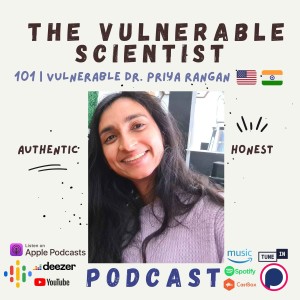
Tuesday Apr 26, 2022
Tuesday Apr 26, 2022
Dr Priya, a scientific communicator, is an experienced scientist with 11 years of combined working experience in academic research and pharmaceutical settings. Skilled in nutritional treatment applications for inflammatory bowel disease, Alzheimer's disease, and T cell immunotherapies, cell culture, in vivo mouse studies, microscopy, public speaking, science education, and scientific writing. Her PhD focused on the Biology of Aging from the University of Southern California.The Vulnerable Scientist is a Kenyan-based podcast that focuses on scientists' stories about their daily lives, work, and how they got to where they are. I am your host Sarah Nyakeri, a scientist, informal science communicator and a hiker. I am a multidisciplinary individual that does digital marketing and website design during my free time.The main questions asked that scientists are expected to answer vulnerable are: How are you, Introduce yourself, how did you become a scientist, What are the highs and lows you have experienced in your science career, tell the listeners about your hobbies, what question would you like to answer that has not been asked and how do you feel after having this conversation.Why did I start this podcast? You might ask. When doing my MSc project, my experiments started to fail at a certain period and it was very frustrating. I thought, If I finally get a new vaccine target for CBPP in cows, it would be all smiles but no one will ever know what I went through. I also wondered how many scientists were going through the same rough patch but did not openly talk about it?One day when I had just had a rough day, I talked into a mic about my day and I felt better. That was the first episode. At first, I thought it would just be journalling but after some fellow scientists heard it, they wanted to be Vulnerable too. Since then I have brought scientists from different fields to tell their stories of the highs and lows they have experienced with honesty and authenticity being the lead of our informal and long conversations.I enjoy asking questions since I am a naturally curious person. Feedback from the audience, including scientists and non-scientists, is the main motivation I message scientists or accept their request to be on the podcast, schedule an interview, edit audio, design the artwork, post it, and share it on social media platforms. It is a full-time job that requires me to spend from my pocket with no monetary returns, but I enjoy it.If you want to be Vulnerable on the show, send me an audio message either on speak pipe (https://www.speakpipe.com/VulnerableScientistVoicemail ) or anchor (https://anchor.fm/thevulnerablescientist/message).Feel free to reach out too if you want to talk about a certain topic in the science career space or anything as a scientist that might have nothing to with science but affects scientists. The podcast is on social media @TVscientistPod and Website; TheVulnerablescientist.com.You can support the show (https://www.patreon.com/thevulnerablescientist) on Patreon or Paypal sarahnyanchera(at)gmail or Mpesa at (254)0718896962 under Sarah Nyakeri. See acast.com/privacy for privacy and opt-out information.
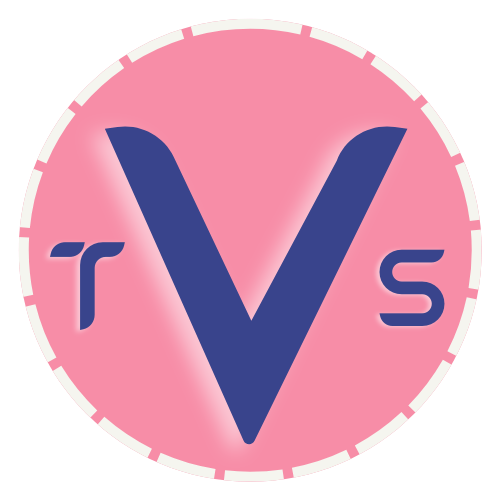
About
Only scientists who are honest and authentic or are working towards it will be on this podcast.
Professor Brene Brown’s research shows that vulnerability fosters good emotional and mental health. It is a sign of courage. We become more resilient and brave when we embrace who we truly are and what we are feeling. The Vulnerable Scientist Podcast is a space for scientists to tell their honest and authentic stories.
I am your host Sarah Nyakeri who happens to be a scientist, and Informal science communicator and I help scientists create personal websites.
If you want to support this show, go to www.patreon.com/thevulnerablescientist.com You can also follow this podcast on all social media platforms @TVScientistPod
